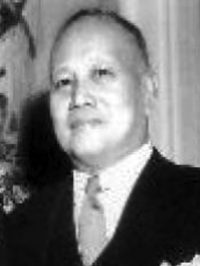Americans on board are going crazy over souvenirs of ₱5000 Japanese bills with our signature.
We were told to get ready. We did not actually leave the boat until about 3 p.m. We were loaded in three amphibian boats. After an hour sailing on a river, we reached the Colony. The boat went up the bank and functioned like a truck. It certainly is a wonderful invention. We saw amphibians for the first time along the road from Tubao to Manila and I was glad I had the experience of embarking in it. It is a real boat when on water and a real truck when on land.
We reached Iwahig at about half past four. We were taken to a stockade less than 100 meters long and about 80 meters wide. We were divided into three groups for the three “Camarines”. The “Camarines” are big enough for our number. The list of prisoners included high officials of the Commonwealth government, prominent citizens, businessmen, Hukbalahaps, Makapilis, and those accused of murder and other atrocities.
Upon our arrival, Col. Forbes who escorted us on board the Lewis Morris ordered us to line up. He made a few remarks which substantially were as follows: “I have been designated to be your head custodian in the representation of the United States Government and of the Philippine Government. It is a painful duty, a task which I would have preferred not to have. I want to make your position clear. You are not here as criminals or convicts. Your status shall be that of a war prisoner under the Geneva Convention. I hope you will not try to escape. If anybody outside talks to you, ignore them. Until I receive instructions you shall all be treated equally. If you want anything or desire to say anything you shall communicate with me.”
In that talk there is an insinuation that we are being held to protect our lives. Such a protection may be necessary for those in the service of the Japanese who had killed or committed abuses. It may be necessary for those who had been spies. But certainly we do not need such protection as our lives are not in danger. Our people perfectly understand that our purpose was only to protect them and to serve them.
Col. Forbes then asked whether anybody wanted to say something. Mr. de la Rama mentioned Minister Quintin Paredes as one who might want to speak. Mr. Paredes declined to say anything.
Afterwards, we selected our respective places. I selected building No. 2. We occupied a corner—Minister Jose Paez, Gen. Francisco, Vice Minister Sergio Bayan and Gov. Sebastian, and myself.
We took our meals in our quarters until May 5, when we were asked to move to the mess hall nearby. At the beginning we all refused to go. Mr. Paredes and I vehemently protested on the ground that it was too much humiliation. I said that I preferred not to eat. Mr. Paredes began shouting at the Sergeant who had asked us to go. Later a meeting was held and cooler heads suggested that the Sergeant could do nothing as he was merely complying with the order of his superior. Since the Colonel was away, we better obey in the meanwhile. We then marched to the mess hall located near the plaza about 200 meters away. It was also built like the “Camarines” but the walls are much higher. The kitchen before which we lined up to get our ration, was just in front of the mess hall. We found the place really better. At least the jostling to get the food stopped and it was easier to keep our quarters clean.
We saw the necessity of organizing especially in order to have and enforce rules on sanitation. A council was selected and Chief Justice Yulo was elected Chairman. Committees were created, among which were that of Peace and Order, and Sanitation to which Mr. Paredes and Mr. Bayan were appointed, respectively. All seem to understand the necessity of keeping perfect peace and no one showed any opposition. The Sanitation Committee, however, had its hands full. Cleanliness was not observed by some especially in the toilets. Cigarettes and used matches were thrown everywhere. Bayan was so desperate that he wanted to resign. Paredes threatened to turn over the enforcement of the rules to the Army. The position of Liaison Officer to discuss matters with Col. Forbes and his assistant, Lt. Severance, was created. Jose Sanvictores was designated for this position.
